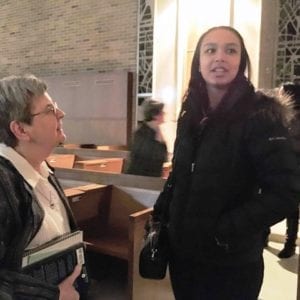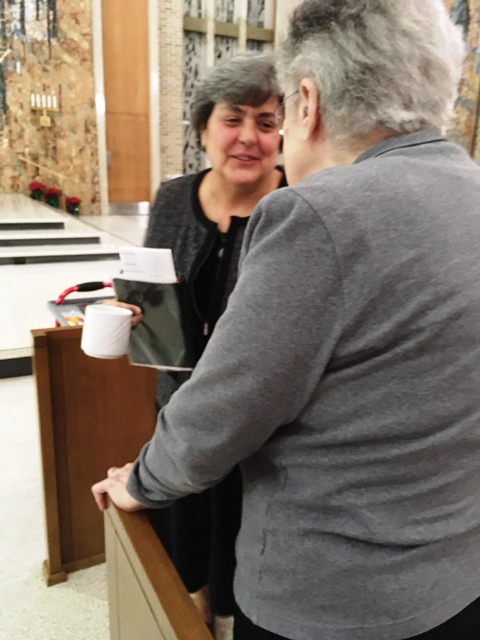Sister Rebecca Ann Gemma, OP, prioress general of the Dominican Sisters of Springfield, preached at the first of a series of Evening Prayer & Preaching events scheduled at Sacred Heart Convent for 2020. Learn more here.
Her text was Philippians 2:1-11.
Peter Scazzero, the author of Emotionally Healthy Spirituality, is quoted as saying, “Jesus may be in your heart, but Grandpa is in your bones.” Individually, institutionally, and nationally, we are influenced by the past.
Consequences of actions often repeat themselves in families and institutions throughout decades. Undiscovered or unexamined, we often find ourselves unwittingly shaped, informed and influenced by forces and factors from one generation to another. Some of our behaviors are a clear matter of choice, and some are matters of our inheritance—conscious or not. In order to address the health of our communities, nation, world, and universe we must become more aware of, and address, not only what is in our hearts, but also what is in our bones.
Race and racial injustice are in the bones of the United States of America as we have seen the genocide of Native Americans, the expressions of anti-Semitism, the impact of African-American slavery and segregation, Asian internment camps, the current proliferation of detention centers for those crossing the borders, discrimination against Latinx migrant workers, white racial superiority with respect to ethnic or racial minorities, and more.
Race and racial injustice are not just in the bones of our nation. They are in our cities, towns, and outlying areas. In large and small cities, we see neighborhoods designed to keep safe the privileged and keep out the marginalized. From health care centers, schools, airports, recreational facilities, and grocery stores to the very churches in which we worship, there are both defined and nuanced ways in which separation is anointed and differences are categorized as “less than,” “good,” “better,” and “best.”
"Might we, then, come to grasp racial justice...as our claim to having the same mind and heart as Christ?"
2019 was the 400th anniversary of slaves being brought to the shores of Virginia. Slavery, the sin of human bondage, helped form our country and has forever enmeshed its evil within a growing economy, development of the class system, and the objectification of human beings by those in power. This entrenchment allowed for the legal justification of slavery etched in the Constitution with the Three-Fifths Compromise declaring Africans and those of African descent three-fifths human. Churches, boasting of their Christian identity, remained complicit, fostering various doctrines and silence in the system we call racism today.
Race and racial injustice are not just in the bones of our Church, they are within our very beings.
What happened? It did not begin this way…for in Genesis (1:26-27, 31) we read:
Then God said, “Let us make humankind in our image, according to our likeness. So God created humankind in God’s image, in the image of God, God created them; male and female, God created them. God saw everything that God had made, and indeed, it was very good.”
Humanity as creation is the very image of God. And God said it is very good. What happened? God, in God’s profound vulnerability, gave us freedom to choose. For some, these choices became self-serving and power-grabbing, leading to norms of entitlement for a few and oppression for others. Racism, an aggregate of these choices, became—and remains—a human construct in which one’s very color and/or culture regulates who sits at the banquet of plenty and who determines what scraps will be given to those “others” perishing outside.
But into this chaos, this very stuff of distorted identity and falsehood, God came to share our humanity. The Word was made flesh. Incarnation happened!
Though he was in the form of God, Christ emptied Christ’s self, taking the form of a slave being born in human likeness. The very nature of God is self-emptying. It is in being One with us!

There is no stinginess here, no bias. All of Christ, in Jesus, was freely given to all! Nowhere in scripture does it say that Jesus only became one of the few! He became totally, vulnerably, intentionally, HUMAN. With his fullness of divinity set aside, he took on the very DNA of the human species. His heart and his bones were like yours and mine.
And we as human beings are to give of this same LOVE—for the sake of others—freely, unconditionally, and without reserve. Racism chokes the natural and spontaneous impulse to help another human being, simply because she or he is another human being suffering. We put conditions on our giving, making sure our comfort and status does not take a hit.
Abraham Joshua Heschel reminds us that, “While some are guilty, all are responsible.” Through incarnate love and sacrifice, Christ makes Christ’s own all who are named “the other.” In solidarity, our God shares in the suffering of the oppressed. And we, who share the DNA of Incarnate Love, we, who are baptized into the life and death of Christ, we, who are preachers of the Word made flesh, we are called to do the same.
Might we, then, come to grasp racial justice, not just as an issue of political correctness, minority rights, or accommodation to liberal culture, but rather as our claim to having the same mind and heart as Christ?
Let this Oneness be our claim to theological integrity, human dignity, and racial equity. Can we find our way to a genuinely diverse society, racially and culturally, where diversity is seen as blessing and strength rather than as a threat? It is not that the whites become black or the black become white…but that we become more human, united in Christ. God gifts us, as God gifted Jesus, with the capacities to grow in wisdom and love.
By virtue of our Oneness in Christ, we are to speak the truth about racial injustice in society and church in the context of God’s universal love.
We are called to a way of being in the world, a radically inclusive way, because of who God is—and because of who we all are in God.
I wish to close with some words from Martin Luther King, Jr’s Nobel Peace Prize acceptance speech in 1964. "I believe that unarmed truth and unconditional love will have the final word in reality. This is why right, temporarily defeated, is stronger than evil triumphant."



I read this article and agree with the point being made (and by the way, it can be made and told in many ways). It makes a point on understanding on what being human and religion should encompass togetherness in spirit. Being a stickler and being once an English student, I want to point out the flaws like typos that need correction. The one I think needs correction is in the missing word “to” in this sentence:
2019 was the 400th anniversary of slaves being brought the shores of Virginia. Slavery, the sin of human bondage, helped form our country and has forever enmeshed its evil within a growing economy, development of the class system, and the objectification of human beings by those in power.
Placed between the words “being” and “brought”.
Thank you for emailing your article.